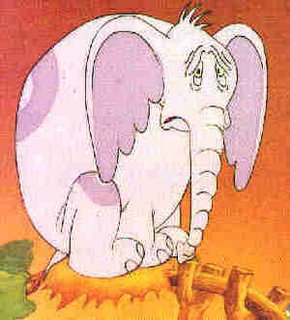The Power of Words.

"I meant what I said and I said what I meant; an elephant's faithful, 100 percent" (Horton the Elephant).
I happen to believe in the power of words. They can both hurt and heal.
"Stick and stones may break my bones, but words can never hurt me."
Baloney! Whoever thought that up wasn't 6'4" and 90 lbs. soaking wet in Jr. High. words can hurt.
That's why I think the use of the right words is so important - words that mean something.
With that in mind, I point you to this article on doublespeak - the kind of use of wods that politicians can tend to use; words that say something but have no meaning. Check out this article by Calvin Woodward of the AP (see the full article HERE):
In Washington, words are a moving target that conceal at least as much as they reveal. Doublespeak runs through the discourse on Iraq, terrorism and domestic matters to a point where it's hard to tell what is going on.How about this for an idea: "Simply let your 'Yes' be 'Yes,' and your 'No,' 'No'; anything beyond this comes from the evil one" (Matthew 25:37).
"By corrupting the language, the people who wield power are able to fool the others about their activities and evade responsibility and accountability," Cato's Timothy Lynch argues in his polemic against doublespeak - an outgrowth of the doublethink and newspeak of George Orwell's "1984."
But nefarious "War is Peace" Orwellianisms are not the only impulse at work, by a long shot.
Some of Washington's bland euphemisms are calculated mainly not to offend. Just as Dead End signs have been replaced in some communities by No Outlet ones, congressional oversight investigators tend these days to find "challenges" in the behavior of agencies, as they politely put it, and not quite so many "problems" - how rude.
Democrats will go to the wall in defense of abortion rights without uttering that unpleasant word, abortion. Instead, they are champions of "choice" or, in a less guarded moment, "reproductive choice." (The cause is advocated by progressives, formerly liberals.)
The wish to be technically accurate was behind the decision of the Agriculture Department this year to squeeze "hunger" out of the equation when considering how many people go hungry.
Hunger, in the words of advisers whose recommendations were accepted by the department, is "an individual-level physiological condition that may result from food insecurity."
The department reasoned it cannot truly measure hunger because it surveys households, and households do not get hungry - people do.
The terms "low food security" and "very low food security" replaced the old descriptions of "food insecurity without hunger" and "food insecurity with hunger."
Say what you mean and mean what you say.












0 Comments:
Post a Comment
<< Home